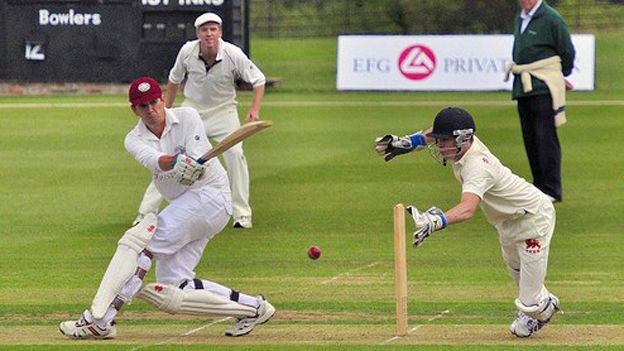Authors and actors revive cricket rivalry
- Published

Two teams of actors and authors are reprising a historic cricket match which died out before World War One. Why?
"To bowl fast is to revel in the glad animal action," wrote the 1950s England cricketer Frank "Typhoon" Tyson, "to thrill in physical power and to enjoy a certain sneaking feeling of superiority over the mortals who play the game."
But what if the person you are bowling to is one of the most famous actors in the world? Does the sense of superiority wane in the face of celebrity?
The writer and pace bowler Nicholas Hogg will face this quandary when opening the attack against Damian Lewis, star of the US TV drama Homeland. "It will be a bit unnerving," he says. "But when the game starts, everyone becomes a cricketer. Nothing matters other than what happens in those 22 yards."
Rivalry between actors and writers is long-established, but it has a special outlet in cricket. In the late 19th and early 20th Centuries a team called The Authors toured the country houses of England. Among its members were Arthur Conan Doyle, AA Milne and PG Wodehouse. The highlight of the season was a game, sometimes played at Lord's, against an Actors XI.
Hogg and current literary stars including novelist Sebastian Faulks and historian Tom Holland turn out for the revived Authors XI. They are taking on the Actors XI, with Game of Thrones' Iain Glen among the players, on Saturday at the cricket-themed Words and Wickets festival at Wormsley, the Buckinghamshire ground built by the late billionaire Sir Paul Getty.
"There's a genuine rivalry," says Hogg." Writers think they create the words and that actors are just the hired hands who speak them. Actors think they are the ones who bring it all to life. There's definitely a level of rivalry there that's always been around."
Peter Sandys-Clarke, vice-captain of the Actors XI, is less sure. "Actors and writers are frequently at loggerheads about who knows best," he says. "Writers are so bad about admitting when they are wrong."
Country house cricket was popular in the late Victorian and Edwardian eras. The best of the Authors XI in those days was Sherlock Holmes creator Conan Doyle, regarded as good enough to have played for a county. He bowled out WG Grace in a match at Crystal Palace in 1900.
Wodehouse, who wrote the Jeeves and Wooster stories, and Winnie the Pooh author Milne were also decent players, but JM Barrie, creator of Peter Pan, was not. In 1887 he set up his own side, called the Allahakbarries, to cater for those with similarly limited abilities.
Barrie, the son of a Scottish weaver, used the matches to raise his social standing and became a friend of the Royal Family. But his left-arm bowling was slow and unthreatening.
Writers on cricket
- "I tend to think that cricket is the greatest thing that God created on Earth" - Nobel Prize-winning playwright Harold Pinter
- "Cricket is a game played by 11 fools and watched by 11,000 fools" - Irish playwright George Bernard Shaw
- "Hail Cricket! Glorious, manly, British game! First of all Sports! Be first alike in Fame!" - British poet and playwright James Love in 1744's Cricket: An Heroic Poem
- "Cricket remains for me the game of games, the sanspareil, the great metaphor, the best marriage ever devised of mind and body" - British novelist John Robert Fowles
- "I understand cricket - what's going on, the scoring - but I can't understand why" - American author Bill Bryson
- "Like the British constitution, cricket was not made: it has 'grown'" - Sir Neville Cardus, writer and critic
The Allahakbarries and the Authors XI existed in parallel, with some players such as Milne and Wodehouse turning out for both. Both sides stopped for World War One and neither got going again when the conflict ended. Barrie was by then in his late 50s, while the appetite for frivolous games had been reduced by the war.
"There was a changed culture," says Kevin Telfer, author of Peter Pan's First XI: The Extraordinary Story of JM Barrie's Cricket Team.
"New authors after World War One were very different. They weren't the sort of people who wanted to go around playing cricket on a Sunday afternoon."
There were reincarnations of the Authors XI in the 1930s, 1950s and 1980s, but they did not last long. The current XI, started in 2012 by Hogg and literary agent Charlie Campbell, aims to combine the spirit of both the old teams. Some players - Birdsong author Sebastian Faulks and the former England batsman Ed Smith, now an author and Times journalist, among them - are more than competent. Others, unnamed by Hogg, are less so.
All are focused on succeeding, with a few caveats. During a recent 20/20 match Tom Holland, best known for his histories of ancient Rome and his translation of the Greek historian Herodotus, tapped into an iPad between deliveries while fielding at fine leg, as he had urgent work to do.
"That's not normal, even for us," says Hogg. "There's an escapism to cricket, which I don't really think there is in any other sport. In the days of Conan Doyle and Wodehouse people played cricket to leave the worries of the world behind.
"In the modern world that's even more difficult to do, with mobile phones, and cricket is one of the few ways you can be completely 'uncontactable'. I relish getting away from that. It's a bit like listening to Test Match Special."
Subscribe to the BBC News Magazine's email newsletter to get articles sent to your inbox.